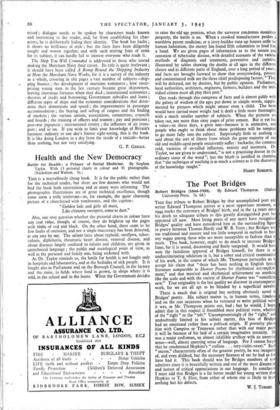The Poet Bridges
University Press. 7s. 6d.)
THIS fine tribute to Robert Bridges by that accomplished poet and writer Edward Thompson arrives at a most opportune moment, as 1944 marks the centenary of Bridges' birth, and in the 14 years since his death no adequate tribute to this greatly distinguished poet has appeared till now. Most living poets of any merit have recognised Bridges' quality and have considered him as the outstanding figure in poetry between Thomas Hardy and W. B. Yeats ; but Bridges was too traditional and austere and too little temporal in outlook to have any vogue among those who are more susceptible to fashion than to merit. This book, however, ought to do much to increase Bridges' fame, for it is sound, discerning and finely tempered. It would have won the fastidious approval of Bridges himself, for there is no undiscriminating adulation in it, but a sober and critical examination of his work, in the course of which Mr. Thompson persuades us to accept his claim that " there has been nothing in English lyrical literature comparable to Shorter Poems for rhythmical accomplish- ment," and that metrical and rhythmical achievement on anything like the scale and with the variety of Shorter Poems was " something new." True originality is the last quality we discover in contemporary work, for we are all apt to be blinded by a superficial novelty. There is much that is original but nothing obviously novel in _ Bridges' poetry. His subject matter is, in human terms, timeless and on the rare occasions when he ventured to write political verse it was, as Mr. Thompson points out, bad ; but he would, I hope, admit that in this respect it resembled most political verse, whethet of the "right" or the "left." Uncompromisingly of the "right," an undoubtedly limited in his subject matter, this bias of Bridges had an emotional rather than a political origin. If posterity places him with Campion or Tennyson rather than with our major poet it will be because of his lack of a certain imaginative intensity. Ht was a major craftsman, an almost infallible artificer with an unerring sense—well, almost unerring sense of language. For I cannot forg that he condemned Hopkins's " stallion . . very-violet-sweet." Such " excess," characteristic often of the greatest poetry, he was incapable of, and even disliked, but the necessary fineness of ear he had as fey have had it. This book should win for Bridges numbers of ne admirers since it is beautifully written and one of the most discem:n and justest of critical appreciations in our language. In conclusio I must add that Bridges is a far better model for young writers th Hopkins or T. S. Eliot, from either of whom one is likely to lear nothing but his defects.
W. J. TURNER.


























 Previous page
Previous page